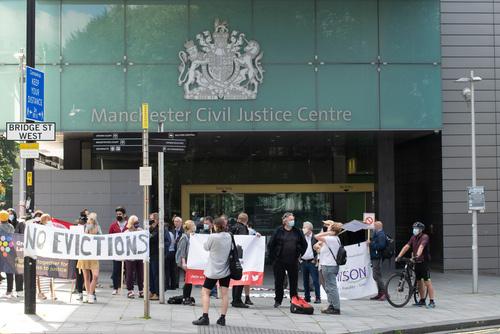
3 minute read
Frequently Asked Questions on the CDC Order Temporarily Halting Certain Evictions
Frequently Asked Questions on the CDC Order Temporarily Halting Certain Evictions
C D C E v i c t i o n B a n
Advertisement
P R O V I D E D B Y J U L I E A N D E R S O N
On September 4, 2020, the Center for Disease Control and Prevention issued a “Temporary Halt in Residential Evictions to Prevent the Further Spread of COVID-19.”
What does the Order limit?
A landlord, an owner of residential property or any other person with a legal right to pursue an eviction shall not evict any covered person from residential property through December 31, 2020 based on the non-payment of rent.
Who is a Covered Person?
A tenant who resides in a residential property who executes and delivers to his/her landlord, under the penalty of perjury, a CDC Tenant Declaration.
Where Can I Locate a Sample CDC Tenant Declaration?
A sample CDC Tenant Declaration form is attached to the Order. A courtesy copy can be located at www.mokslaw.com under the Forms tab in the Federal Executive Order Forms section.
What the Order does not do?
The Order does not stop the eviction process - a landlord may proceed with business as usual (i.e. delivering notices of non-renewal, notices to vacate and filing eviction petitions, obtaining service, entering eviction judgments and requesting writs of restitution) unless and until it receives a signed CDC Tenant Declaration.
Evictions for non-payment of rent can continue if the tenant does not provide the landlord with a signed CDC Tenant Declaration.
The Order does not stop evictions based on tenants engaging in:
criminal activity;
threatening the health or safety of other residents;
damaging or posing an immediate and significant risk of damage to property;
violating any applicable building code, health ordinance, or similar regulating relating to health and safety;
violating any other contractual obligation, other than the timely payment of rent or similar housing-related payment.
The Order does not excuse tenants from paying rent or other charges due under their lease.
Landlords can continue to charge rent, utilities, late fees and/or other charges due for failure to timely pay rent.
Who is Protected?
To be protected a tenant must sign a CDC Tenant Declaration under the penalty of perjury indicating that:
He/she has used his/her best efforts to obtain governmental assistance.
He/she expects to either: Earn no more than $99,000 in annual income for the Calendar Year 2020 ($198,000 if filing a joint tax return); or
Was not required to report any income in 2019 to the IRS; or Received an Economic Impact Payment (stimulus check) pursuant to the CARES Act
He/she is unable to pay the full rent due to substantial loss of household income, loss of hours at work, a lay-off or extraordinary out-of-pocket medical expenses.
He/she is using best efforts to make timely payments that are as close to the full amount as his/her circumstances may permit; and
An eviction would likely render him/her homeless
Each adult listed on the lease is required to sign and deliver a CDC Tenant Declaration to his/her landlord.
What Landlords should do/know:
If a landlord receives a signed CDC Tenant Declaration, the landlord should be aware that the eviction is effectively stayed until December 31, 2020.
Nothing in the Order states that landlords need to disclose the Order or any of its provisions to its tenants.
Numerous Courts (particularly in Kansas) are requiring a landlord to provide its tenant with a blank CDC Tenant Declaration form.
What are the penalties if the Order is violated?
An individual found to violate the Order would be subject to federal criminal prosecution with a fine of up to $100,000 and/or 1 year in jail if the violation did not result in death, or up to a $250,000 fine and/or 1 year in jail if the violation results in the death of a tenant.
An organization found to be in violation of the Order is subject to a fine of up to $200,000 per violation if the violation did not result in a death or $500,000 if the violation results in the death of a tenant.
DISCLAIMER: The Order is subject to additional analysis and interpretation.
Join Julie at the Northland MAREI Meeting for updates on this law, further interpretations and new developments. Bring your Questions.






